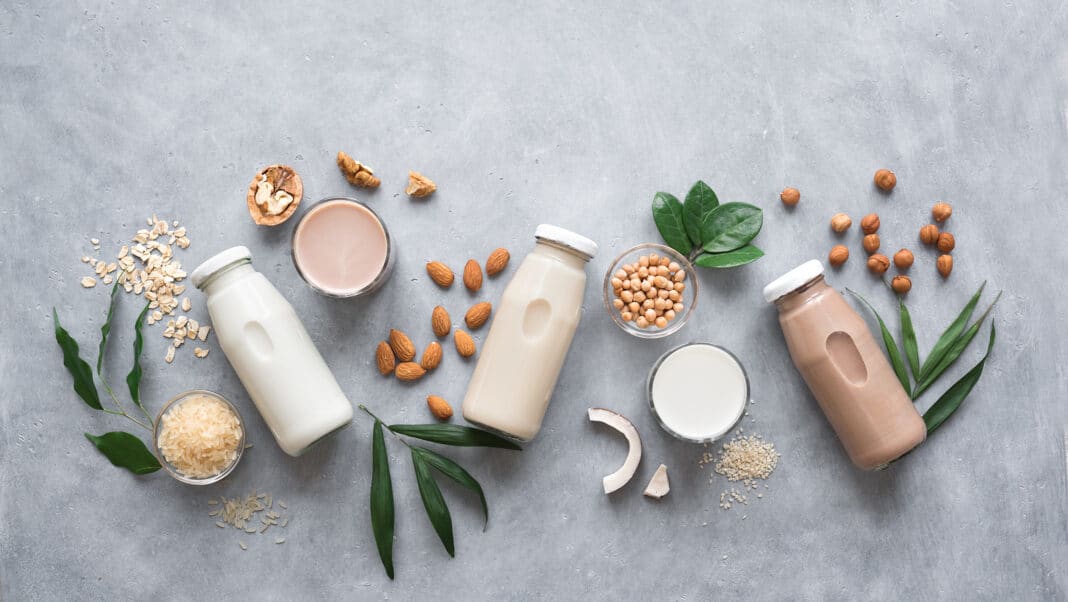Publicity around this ever-changing market is at an all-time high, with post-pandemic sales holding and the high-profile introduction of new regulations. Lauren Addicott takes a look at how this has affected the definition of ‘free from’ and how suppliers have responded
The free-from sector has been through several incarnations in the past decade, moving in and out of fashion in a way one wouldn’t expect from what is effectively a symptom of medical requirements. Created out of necessity for ‘allergics and intolerants’, the market has grown steadily from health store shelves to whole aisles in the ‘big four’ supermarkets.
The expansion of the market is due in large part to increased awareness around the prevalence of allergies. According to Allergy UK, allergy is the most chronic disease in Europe, affecting 20% of the population – a percentage that continues to rise.
Other influences are equally inevitable: improvements in food science, innovations in ingredients and concerns around the environmental impact of certain ingredients. What couldn’t be foreseen was the swift change in consumer behaviour over the past two-plus years, during which time the free-from market has grown by 28.8%. But then, it’s been an unusual time.
Converted consumers
During the pandemic, free-from brands experienced a remarkable boom in sales, a surge attributed in part to consumer ‘adventurousness’ prompted by shortages in mainstream products. Front and centre of that trend was gluten-free flour, meeting the demand of a sudden spike in home-baking – an endearing side-effect of the otherwise bleak national lockdown.
But it’s also been attributed to a renewed interest in health, a concept closely aligned with the free-from sector. Clare Marriage, founder of FREEE, says: “Health and wellbeing continue to be big drivers in the gluten-free space. Outside of those with a medical reason to eat gluten-free, research shows that many shoppers are motivated by health and wellbeing – interest in which has of course grown since the pandemic.”
Inclusivity is important all-year round but disproportionately important for seasonal occasions
But did this combination of necessity and good intentions result in converted consumers, or simply meet a temporary demand? What has been the lasting effect on suppliers?
Marriage is seeing a positive continuation in trends. “Home-baking products such as gluten-free flour and baking mixes have proved particularly popular, with sales of gluten-free flour up 24.2% ahead of pre-pandemic levels and gluten-free bread flour up 38.4%. This suggests many shoppers have continued to find time to make their own bread and cakes, which bodes well for the future.”
What’s more, the Free From Food Awards launched two new categories in the past year – the Free From Christmas Awards and the Free From Easter Award. CEO Cressida Langlands explains the significance of these: “Inclusivity is important all-year round but disproportionately important for seasonal occasions, and it’s evident from the entries that brands and manufacturers are really digging deeper in terms of insight-led development.”
Langlands says the Easter award was created in response to market demand, ‘in recognition of the fast pace at which the offer has evolved recently – brands had been asking where they could enter their products’.
Leading the charge were Easter eggs from NOMO and Moo Free, whose entries boasted zero allergens and zero precautionary allergen labelling (PAL). “This is exciting for the consumer and brilliant for the category,” says Langlands. “Everyone is having to up their game – these and other brands are bringing personality and excitement.”
In terms of what’s next, there’s ample space for the seasonal free-from market to keep expanding. “The free-from Easter offer seems currently to be dominated by chocolate,” observes Langlands. “There is an appetite for more development in that area.” And free-from party snacks are still lacking: “The offer has changed noticeably, but it was stagnant last year and hasn’t gone to the next level, so … we’d like to see innovation here.”
Blurred lines
The sometimes problematic crossover between plant-based and free-from is another reason for market growth, with animal products appearing in six of the 14 allergens. But while the principles align – excluding certain ingredients – the difference is, quite literally, a matter of life and death. Of course, it’s not just a question of clear labelling. As Langlands points out: “[There are] discussions and concerns around how the growth of veganism is impacting free-from in terms of development resource and budgets, and space in store.”
Simon Wright, founder of OF+ Consulting, positions free-from consumers into six categories: allergics, intolerants, free-from, plant-based, vegan and flexitarian. As the latter ‘lifestyle’ categories continue to grow, the lines have no doubt blurred. “I don’t think we’ve seen greater clarity on the relationship between vegan/plant-based and free-from,” comments Wright. “We’ve got three consumer groups with products not necessarily meeting their needs because those three groups have very different needs.”
But the conversation appears to be going in the right direction, elevated by the introduction of Natasha’s Law in October last year. Following her talk at Natural & Organic Products Europe (NOPEX), regulatory lawyer Nicola Smith told NPN that the impact of the regulations has gone beyond those suppliers within its scope. “There is greater awareness more generally of the importance of allergens for people with allergies; there has probably been more of a focus on the availability of free-from foods and the accuracy of free-from labelling.”
“There is still a long way to go,” says Langlands, “but more and more vegan foods are eliminating cross contamination for egg and milk. In the 2022 awards we saw more vegan entries that were ticking allergen-safe boxes. Brands such as Wicked Kitchen are making an effort to go the extra mile and accommodate the needs of the free-from and allergic consumer and are bringing out products that are vegan but with no PAL for milk and egg.
“The FSA’s consultation on May Contains/PAL has gathered views from both manufacturers and consumers, so it’ll be interesting to see their report on the feedback gathered in a couple of months.”
Wright emphasizes that the run-up to and introduction of Natasha’s Law not only raised publicity and encouraged small operators to ‘up their game’ but refocused the discussion on the human element at its centre. “It’s created more knowledge around the impact of allergens on people,” he says. Quick to point out that the aforementioned mid-pandemic boom in gluten-free sales was ‘a double-edged sword’, he adds: “People who have allergies and sensitivities found it very difficult to get the stuff they relied upon. For mainstream consumers who were buying into free-from for lifestyle choices, it was fine. But if you’re unable to eat flour because it makes you sick and you couldn’t get hold of the free-from alternative – for them it wasn’t fine.”
Now, I’ve got to the position where I think that, actually, if palm oil is produced responsibly, it’s a good thing
With so much of the free-from market consisting of ‘lifestyle consumers’, it’s not surprising to see how other divisive ingredients have been ascribed the same narrative, such as sugar, GMO, hydrogenated fats or palm oil. Of course, the latter two follow directly on from each other, as Wright explains, remembering his time at Whole Earth – the first company to replace hydrogenated fat in peanut butter with palm oil. “Then WWF started talking about deforestation and palm oil. Now, I’ve got to the position where I think that, actually, if palm oil is produced responsibly, it’s a good thing. The palm tree is so much more productive than any other vegetable oil, so you get a lot more oil for any given area of cultivation. You don’t need too much land, so it can stay as rainforest.”
The debate between boycotting and sustainable sourcing will not be resolved any time soon. The International Palm Oil Free Certification Trademark (POFCAP) was launched with 2017, and its licensees include Meridian, BetterYou and Viridian.
Meanwhile, companies such as Whole Earth, which only uses certified sustainable sources, are keen to change minds. In January the brand announced it is set to more than double its contribution to its long-running charity partner, the Sumatran Orangutan Society, and has released a Golden Rainforest Edition to support that pledge.
“As a natural brand with a long-standing commitment to the environment, we wanted to support a project that is well aligned with what we stand for as a business,” says Bryan Martins, Whole Earth marketing and category director at Ecotone UK. “We are guided by our mission to protect and grow biodiversity.”
It’s an unusual dichotomy, that both sides of the debate have the same exact goal through different means – and both place the image of an orangutan front and centre.
Progress, naturally
The free-from sector is constantly evolving, ebbing between medical, ethical and fashionable influences. Not that these are mutually exclusive – the recent spotlight on allergy sufferers has coincided with the rise of artisan free-from. This year’s NOPEX highlighted products such as Clearspring’s soya-free Chickpea Miso; Soyze’s Nish, Noya and Noyster sauces; and Mandorino – a pecorino substitute from Fattoria della Mandorla, the first company to produce seasoned vegan cheese from 100% almonds.
Ingredient innovations were on every corner: Nordic Oceanfruit introduced its flavourful Sea Salads, made with organic seaweed; What If? Foods introduced BamNut Milk, a milk alternative made of milled bambara groundnuts; and AIRSNAX showcased four flavours of its ‘miraculously filling’ gluten-free snack – a mix of puffed chickpeas, yellow peas and green peas.
With ever more research into allergens, innovations in food science and a growing awareness of environmental impacts, the demand for new free-from products is limitless. As Wrights put it: “Everyone should constantly think about what they’re eating and why they’re eating it. We’re all a work progress.”
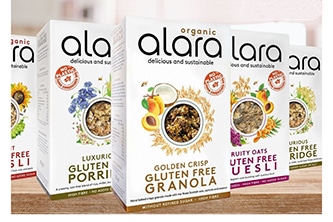 Gluten Free Golden Crisp Granola
Gluten Free Golden Crisp Granola
Alara Wholefoods
Tel: 020 7387 9303
E-mail: [email protected]
www.alara.co.uk
The crunch, the decadent bite and the organic wholesomeness; Alara’s Gluten Free Golden Crisp Granola has it all! Organic Vegan Products in home-compostable packaging, Alara brings you the distinguished Gluten Free range. They do not include either additives or preservatives making sure your body receives the nutrients it needs from 100% natural ingredients. Organic Alara; Delicious, Nutritious and Sustainable, the perfect choice for a healthy breakfast bowl.
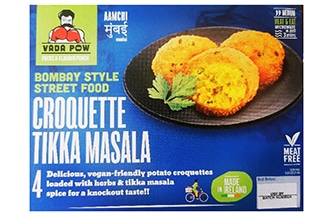 VADA POW Croquette Tikka Masala
VADA POW Croquette Tikka Masala
Vada Pow Ltd
www.vadapow.com
VADA POW’s award-winning vegan Spiced Potato Cakes and Croquette Tikka Masala, bringing authentic Indian street food to UK homes. This unique range of frozen vegan and vegetarian products may be inspired by Indian street food but are very different from stereotypical Indian curry products. All products in the range are designed to be tasty, convenient but most of all, authentic. They can be eaten on their own, as a snack or as part of a more substantial meal, and as they naturally contain no animal products, are suitable for vegetarians and vegans.
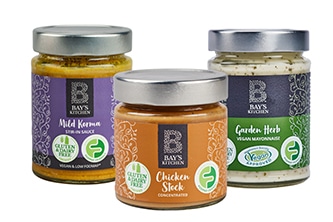 Bay’s Kitchen Gluten Free, Dairy Free & Vegan Foods
Bay’s Kitchen Gluten Free, Dairy Free & Vegan Foods
Bay’s Kitchen
Tel: 07342 161234
E-mail: [email protected]
www.bayskitchen.com
Bay’s Kitchen create an award-winning range of certified Gluten Free, Dairy Free and Low FODMAP foods. This includes our best-selling Mild Korma Stir-in Sauce, Garden Herb Vegan Mayonnaise and Concentrated Chicken Stock. Made without hard-to-digest ingredients, like onion and garlic, these foods enable those with digestive issues to eat with ease without compromising on taste or quality. These are made for convenience, with many of the products being ready to use or simply needing a few minutes to heat up.
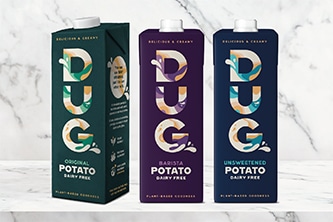 DUG
DUG
Veg of Lund UK Ltd
E-mail: [email protected]
www.dugdrinks.com
Challenge your perceptions, step away from the norm, and delve into the unexpected world of DUG: the most sustainable m!lk alternative on the market*.
Dug from the ground, potatoes provide a perfect base for a dairy alternative: neutral tasting, nutritious, and super-sustainable. They’re naturally free from common allergens like soy, nuts and gluten, which earned DUG the Best Allergy Friendly Product award at the World Food Innovation Awards 2021.
Go on. We dare you. Try the potato-powered wonder that’s full of goodness and free of risk. Embrace the unexpected. Go potato. #DAREtoDUG.
*Compared to oats, soy, rice and almond dairy alternatives.
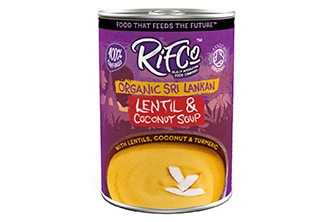 RIFCo Organic Sri Lankan Lentil & Coconut Soup
RIFCo Organic Sri Lankan Lentil & Coconut Soup
Healthy Food Brands Ltd
Tel: 01403 786460
E-mail: [email protected]
www.healthyfoodbrands.co.uk
Sri Lankan dishes blend a fusion of exotic flavours to create the most delicately aromatic of food. Our delicious Organic Sri Lankan Lentil and Coconut Soup combines red lentils, coconut, dhal and spices and owes its flavours to the traditional recipes of Yala National Park in the south eastern tip of the tropical island. Naturally free-from gluten and dairy for a delicious and nutritious plant-based meal.
Available from Suma, CLF, The Health Stores, Tree of Life, Queenswood, Infinity & Essential.


